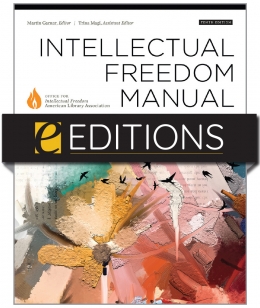
Primary tabs
You don't need to be an ALA Member to purchase from the ALA Store, but you'll be asked to create an online account/profile during checkout to proceed. This Web Account is for both Members and non-Members. Note that your ALA Member discount will be applied at the final step of the checkout process.
If you are Tax-Exempt, please verify that your account is currently set up as exempt before placing your order, as our new fulfillment center will need current documentation. Learn how to verify here.
- Description
- Table of Contents
- About the authors
- Reviews
Using a topical arrangement with easy-to-read summaries to help readers find information quickly, this manual offers valuable support to library workers as they continue the important work of safeguarding intellectual freedom.
The newest edition of the Intellectual Freedom Manual is more than simply an update of a foundational text that has served as a crucial resource for more than four decades. It is a living document that serves as the authoritative reference for day-to-day guidance on maintaining free and equal access to information for all people. Whether you’re developing or revising policies, on-boarding new staff or trustees, responding to challenges and controversies, or studying librarianship, you’ll find this an indispensable resource, with features such as
- ALA policy statements, approved by committees and Council, articulating core intellectual freedom principles and best practices;
- 8 new interpretations of the Library Bill of Rights, which address urgent issues like internet filtering, public performances, political activity, religion, and equity, diversity, and inclusion;
- “Issues at a Glance” sidebars which present key concepts, points of law, tips, and questions for reflection;
- expanded content about developing library policies that support intellectual freedom;
- updated information on censorship of library programs, displays, and databases;
- “Advocacy and Assistance,” a section offering concrete guidance when you’re called on to talk to the media or meet with legislators;
- Deeper Look essays which examine the laws related to library operations;
- advice on when to call the police, when not to, and how to handle personally identifiable information when they arrive; and
- an expanded glossary.
Martin Garnar
Martin Garnar is the director of the Amherst College Library. He has taught professional ethics, library instruction, and the foundations of library and information science for the University of Denver’s LIS program. He has served as chair of the ALA’s Intellectual Freedom Committee and the Committee on Professional Ethics and as president of the Freedom to Read Foundation.
Trina Magi
Trina Magi is a library professor and reference and instruction librarian at the University of Vermont. She has chaired state and regional intellectual freedom committees, served on the ALA Intellectual Freedom Committee, and published a number of articles on privacy. She has won several awards for her intellectual freedom advocacy.
Office for Intellectual Freedom (OIF)
ALA's Office for Intellectual Freedom (OIF) is charged with implementing the intellectual freedom policies of the American Library Association through educating librarians and the public about the concept of intellectual freedom as embodied in the Library Bill of Rights, the Association's basic policy on free access to libraries and library materials. In order to meet its educational goals, the Office undertakes information, support, and coordination activities.
”The tone of the IFM is straightforward and complete: it reflects both the gravitas and the complexity of the issues but appears to trust the reader to understand the complicated issues and to be capable of making the 'right' decisions. In some ways, the IFM even feels nurturing: it gives the reader the materials that they need to understand intellectual freedom ... Intellectual freedom is a complex, difficult topic, and the IFM handles it well."
— College & Research Libraries
”An extremely practical and useful guide for librarians dealing with intellectual freedom topics, offering both foundational understanding of the topic and applicable guidance for navigating related situations. The documents provide definitions and clear steps to troubleshoot associated questions and problems."
— Choice
Praise for previous editions
"The text is very well written and provides a wealth of information about each topic, including specific situational examples and explanations of the law surrounding the different topics. The information is organized well and includes great details to make navigation as simple as possible. It is very helpful to have all of this information collected and organized in one simple resource. Proponents of intellectual freedom would benefit from having a copy of this manual on hand."
— ARBA
"Some barriers to reading are imposed by community members, parents, and laws, and librarians ought to be familiar with readers' rights and the library's responsibility to its readers. So, keep this manual handy! … Foremost, the editors and authors have packed into fewer than 300 pages a useful toolkit for librarians' work to provide services and to understand terminology, fundamental documents and the information professionals' responsibility to unwaveringly stand up to protect intellectual freedoms of the citizenry."
— Reference Reviews
”It is best to be prepared, and all U.S. librarians should have a basic understanding of the principles outlined in this book."
— Journal of Hospital Librarianship


